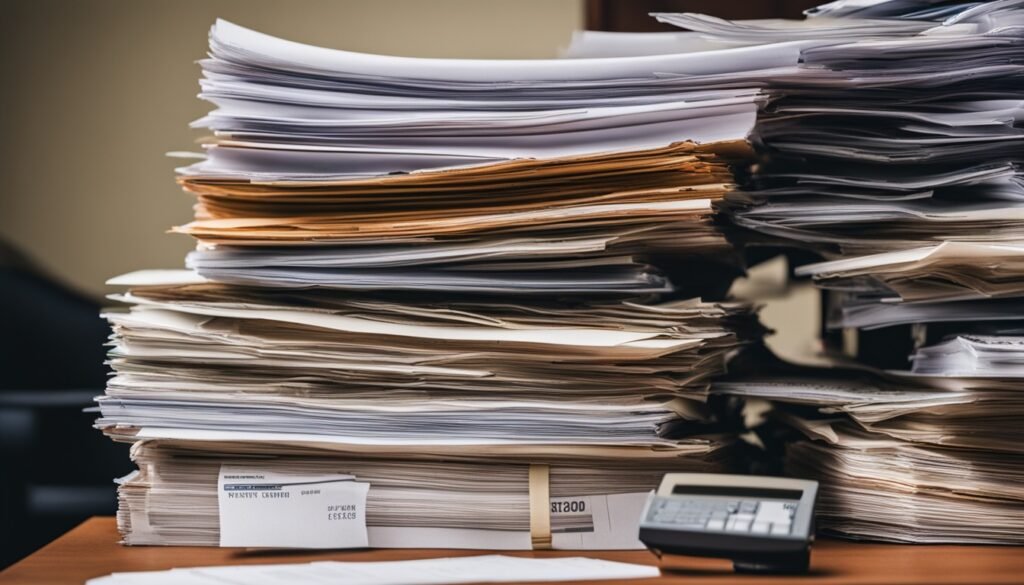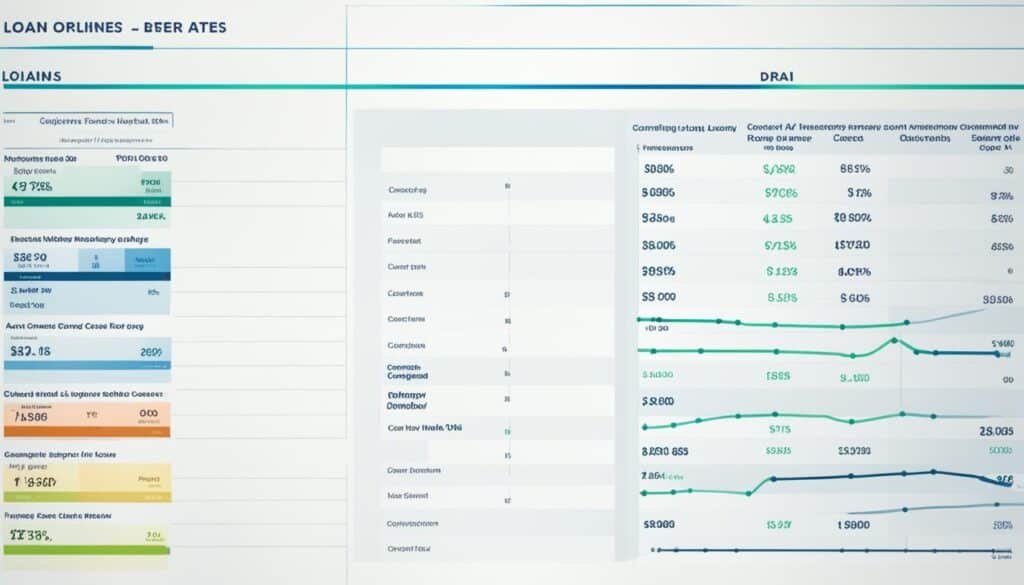A Personal Loan: Personal loans can be quick help for many things. They’re great for paying sudden bills, grouping debts, or making your home better. They can also help fund big moments like weddings. To boost your chances of getting a loan, you must know what the lenders look for.
Key Takeaways
- Understand your credit score requirements and take steps to improve it if necessary.
- Gather all the needed financial papers, like ID and income proof.
- Check different lenders to get a good deal on interest rates and terms.
- Lower your debts and find ways to earn more to keep your finances in good shape.
- Decide on a loan amount that you can pay off without trouble.
Understand Your Credit Score Requirements
Your credit score is really important when you want to borrow money. People with excellent credit scores can get the best interest rates and loan terms. But, don’t worry if your score is lower. You might still be able to get a loan, although the interest rates could be higher.
Check Your Credit Score
It’s key to know your credit score before you apply for a loan. You should check it with the big three credit bureaus (Experian, Equifax, and TransUnion). Knowing your score helps you see what you need to work on.
Improve Your Credit Score
If your score is not great, you can work to make it better. Pay your bills on time, avoid using too much credit, and don’t apply for too many new credit cards. Doing these things can boost your chances of getting a loan with good terms.
Maintain Good Credit Habits
After getting a loan, keep up the good work. Always pay on time, don’t use too much of your available credit, and keep an eye on your credit score. This way, you’ll keep your credit score healthy for the future.
Also Read :Bank Of America Auto Loan: Apply Online & Get Pre-Approved
Organize Your Financial Documentation

Getting a personal loan means lenders will need to see your identity, income, and address. Having these documents ready early makes the loan application process smoother. It also boosts your chances of being approved.
Proof of Identity
They’ll ask for a valid driver’s license, passport, or any other ID to verify your identity. This is to make sure you aren’t pretending to be someone else. It also helps prevent fraud.
Income Verification
Lenders might ask for pay stubs, tax returns, or bank statements to verify your income. This paperwork shows you have a steady income. It lets them see how likely you are to repay the loan.
Proof of Address
You will need to show where you live with documents like a utility bill. This proof of address could include a rental agreement or mortgage. It confirms you are in a place that qualifies for the loan. Plus, it’s essential for getting the rest of the needed paperwork ready.
Also Read :How Do I Qualify For A Personal Loan Refinance?
Compare Lenders and Loan Options

When looking for a personal loan, you should check out different lenders. This helps make sure you get the best deal. Think about interest rates, loan fees, repayment times, and if the loan is secured or not.
Interest Rates and Fees
Different lenders offer loans with varying rates. It’s wise to compare. Keep in mind they may also add origination fees or other charges, influencing total borrowing costs. Compare these costs to select the most budget-friendly option.
Loan Terms and Repayment Periods
Personal loans have various repayment periods, from one to five years or more. Shorter periods mean less in interest but higher monthly payments. Longer periods have lower monthly payments but more interest overall. Pick a term that suits your budget and goals best.
Secured vs. Unsecured Loans
Loans can be secured, needing collateral like a car, for lower rates. Or unsecured, without needing collateral but with possibly higher rates. Think about what you need and prefer in terms of risk when choosing.
Finding the right personal loan starts with comparing lenders and their loan plans. Understanding interest rates, fees, and payment periods is key. This knowledge can help save money on your loan.
| Lender | Interest Rate | Loan Fees | Loan Term | Loan Type |
|---|---|---|---|---|
| Acme Lending | 10.99% | $295 | 36 months | Unsecured |
| Reliable Financial | 8.75% | $175 | 48 months | Secured |
| Premier Loans | 12.25% | $350 | 24 months | Unsecured |
| Secure Lending Co. | 9.50% | $225 | 60 months | Secured |
Improving Debt-to-Income Ratio

When you want a personal loan, lenders check your debt-to-income (DTI) ratio. This ratio shows how your debt compares to your income each month. A DTI below 50% shows you can handle a new loan well.
Pay Down Existing Debts
To make your DTI ratio better, focus on lowering your debts. You can do this by paying more on your credit cards or loans. This lowers your debt amount and improves your chances for a loan with good rates.
Increase Income Streams
Lifting your income can also cut your DTI ratio. Consider a part-time job, freelancing, or aiming for a higher position at work. More earnings show lenders you’re able to afford a new loan comfortably.
Reducing debt and earning more are great steps to take. They help lower your DTI ratio and prepare you for a loan application success.
Also Read : Cash Advance Loans: Get Fast Cash When You Need It Most
Choose a Realistic Loan Amount

When you want a personal loan, it’s smart to think about how much you need. It’s important not to borrow more money than you really need. This can make your monthly payments and the interest you pay higher. It could make it hard for you to manage your money.
To figure out what you can afford, you should use a personal loan calculator. With this tool, you can see how much you’ll need to pay every month. Just type in the loan amount, interest rate, and how long you’ll take to pay it back. This makes sure the loan is a good fit for your budget.
Being careful when figuring out how much to borrow and planning your budget is very important. These steps will help you get a loan that you can pay back easily. It won’t make things tough for you each month.
Also Read :Can I Get An Upgrade Loan For Home Improvements?
Exploring Secured vs. Unsecured Loans

Looking into a personal loan? It’s key to know about secured and unsecured options. These loan types vary in interest rates, how you get approved, and the risk involved. The choice between them greatly impacts your borrowing experience.
Secured Loans: Collateral Requirements
Secured loans need something valuable from you, like a house or car, as a guarantee. You might get lower interest rates and borrow more. But, if you don’t pay, the lender can take your collateral. This means there’s a risk of losing what you put up.
Unsecured Loans: No Collateral Needed
For unsecured loans, you don’t have to risk your car or house. It’s all about your credit and ability to pay. These loans often have higher interest rates because the lender is taking on more risk. But, they can be good if you don’t want to risk losing your assets.
| Secured Loans | Unsecured Loans |
|---|---|
| Require collateral, such as a car or home | Do not require any collateral |
| Generally offer lower interest rates | Typically have higher interest rates |
| May allow for higher loan amounts | May have lower loan amounts |
| Lender can seize collateral if loan is defaulted | Lender has no claim on the borrower’s assets |
| Borrower risks losing the collateral | Borrower does not risk losing any assets |
Choosing between secured and unsecured loans? Think about your money situation, why you need the loan, and if you can pay it back. Knowing how these loans differ will help you pick the one that’s right for you and your finances.
Also Read :Discover Subsidized Loans Affordable Financing Options
Checking and Correcting Credit Reports

Before applying for a personal loan, make sure to check your credit reports. You should look at reports from Experian, Equifax, and TransUnion. Errors, such as wrong account info or fraud, might hurt your credit score. This could make it harder to get a loan.
Dispute Inaccuracies
If you find mistakes on your credit report, don’t wait to fix them. For any issues, reach out to the credit bureaus. They can help you check and fix these mistakes. Fixing these problems is key for your credit score to show your true financial standing.
Monitor Credit Reports Regularly
To keep your credit report right, check it often. Get reports from all three major credit bureaus. Doing this lets you find and fix errors fast. It keeps your credit score high and helps lenders see you in a good light.
Building a Positive Relationship with Your Bank

It’s smart to build a good relationship with your bank. This can help when you need a personal loan. If you’re careful with your money, like keeping a healthy checking account and always paying on time, your bank is more likely to offer you a loan. You might even get better terms and easier ways to pay back the loan.
Maintain Good Financial Habits
Keeping up with your bank and how you handle money is important. Check your accounts often to catch any problems early. Try not to spend more than you earn, and keep your debts low. If you show your bank that you’re reliable, they’ll treat you well. You’ll get better service because they’ll know they can trust you.
Also Read : Improve Your Score With Self Credit Builders
Open Communication
Being open with your bank is crucial when you want a loan. Talk to them about your financial dreams and any worries you have. They’ll appreciate that you’re honest. This honesty can help them help you by offering loans that really work for you.
Considering Co-signers or Guarantors

If your credit or income isn’t strong enough for a personal loan, consider asking someone with good credit to help. They can co-sign or be a guarantor on the loan. Doing this may help you get the loan and even get better loan terms and interest rates.
Benefits of a Co-signer
Having a co-signer with good credit is helpful in many ways. They can help you meet the lender’s requirements, boosting your chances of getting the loan. This can lead to better loan terms. Also, their good credit can reduce the amount of money you owe, which makes the loan cheaper for you.
Risks Involved
Involving a co-signer has risks too. If you don’t pay back the loan, the co-signer must. This could hurt their credit score and make it tough for them to get loans later. It’s vital to know these risks and talk openly with your co-signer to ensure you can pay back the loan.
Conclusion
To get a personal loan, you need to prepare well. Know what your credit score needs to be. Make sure your financial documents are in order. Look at different lender options, and fix your debt-to-income ratio. Also, pick how much money you really need.
There’s a difference between secured loans and unsecured loans. Keep checking your credit report for mistakes. You could also think about getting a co-signer. This all makes it more likely that you’ll get your loan approved.
It’s smart to have a good relationship with your bank. It shows you’re good with money. This could help you get a better deal on your loan.
Follow these steps to apply for a loan with confidence. This way, you can get the money you need. It doesn’t matter if it’s for paying off debt or other needs. Being informed and ready can improve your chance of getting a loan and good loan terms.
FAQs
What are the key factors lenders consider when evaluating a personal loan application?
When you apply for a personal loan, what lenders look at is important. They check your credit score and how much debt you already have. They also look at your income and the amount of loan you want.
How can I improve my chances of getting approved for a personal loan?
Want a better shot at getting a personal loan? First, work on boosting your credit score. Also, get your financial paperwork organized. Then, shop around for the best deals. It doesn’t hurt to have someone with good credit vouching for you, too.
What is the importance of my credit score when applying for a personal loan?
Your credit score is a big deal when seeking a personal loan. People with very good credit usually enjoy lower interest rates. But, don’t worry if your score is not perfect. You might still get a loan, just maybe not at the best rates.
What financial documents do I need to provide when applying for a personal loan?
To get a personal loan, you’ll need to show proof of who you are and where you live. You’ll also have to prove how much you earn. This usually means gathering documents like a driver’s license, pay stubs, and utility bills.
How do I compare personal loan offers from different lenders?
A smart move is to look at what different lenders offer before picking a personal loan. Consider things like interest rates and if the loan is secured. Don’t forget about any extra fees and how long you have to repay the loan.
How does my debt-to-income ratio affect my personal loan application?
Your debt-to-income ratio (DTI) is a key figure. It tells lenders how your monthly debts stack up against what you earn. A lower DTI, usually under 50%, is better for your loan chances.
How do I determine the right loan amount for my needs?
It’s vital to figure out exactly how much you need to borrow. Borrow only what you need. Using a loan calculator can help you see how it affects your monthly payments and what you’ll pay in the end.
What is the difference between secured and unsecured personal loans?
A secured loan ties to something valuable you own. This could be your car or home. An unsecured loan doesn’t need any collateral. But, you often need a better credit score to get one.
How can I ensure the accuracy of my credit reports before applying for a personal loan?
Double-check your credit reports before you apply for a personal loan. You want to make sure they’re correct. Mistakes on your reports can hurt your credit score and your loan options.
How can building a positive relationship with my bank help when applying for a personal loan?
Having a good relationship with your bank can help your loan application. If your bank knows you’re good at managing money and paying on time, they might be more willing to help.
When should I consider a co-signer or guarantor for a personal loan?
If your own credit or income isn’t great, consider a co-signer. This is someone with good credit who agrees to pay the loan if you can’t. A co-signer can make it easier to get a loan with better terms.
Source Links
- https://www.experian.com/blogs/ask-experian/personal-loans-what-to-know-before-you-apply/
- https://www.bankrate.com/loans/personal-loans/how-to-get-personal-loan/
- https://www.forbes.com/advisor/in/personal-loan/10-tips-to-increase-your-chances-of-getting-a-personal-loan/




